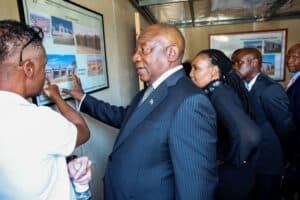The African National Congress is determined to protect President Cyril Ramaphosa.

Members of Parliament will not be voting in secret on Tuesday when they decide whether to adopt the Section 89 panel’s report on President Cyril Ramaphosa’s Phala Phala dealings.
On Monday, National Assembly (NA) Speaker Nosiviwe Mapisa-Nqakula declined requests to reconsider her decision to not allow the secret ballot to be used as a voting procedure on the report.
ANC warns members
MPs in the National Assembly (NA) will on Tuesday decide on the way forward, on how Parliament will deal with the report.
However, The African National Congress (ANC) has sent a clear message to its members – to protect the president.
This will effectively mean the end of the process should every single member, all 230 of them, should they be available to participate in the debate and vote in line with the instruction from the ANC.
Secret ballot
Leaders of the African Transformation Movement (ATM), the African Christian Democratic Party (ACDP), the Pan Africanist Congress of Azania (PAC), the African Independent Congress (AIC) and the United Democratic Movement (UDM) wrote to the Speaker requesting her to reconsider her decision to decline a secret ballot.
The African National Congress (ANC), on the other hand, wrote to the Speaker requesting that she affirms her earlier decision.
“The Speaker, using her powers as enjoined by the NA Rules, has a right to exercise her discretion in determining the voting method to be employed when deciding on questions before the House – where no voting method is prescribed in the Rules of the National Assembly,” Parliament’s spokesperson Moloto Mothapo said.
ALSO READ: ANC fires warning shots against defiant MPs planning to vote against Ramaphosa
Constitutional responsibility
Mothapo said Mapisa-Nqakula had a constitutional responsibility to consider all prevailing factors in exercising her discretion to determine the appropriate voting mechanism.
“She stressed the importance of ensuring due regard to an environment of accountability and at the same time maintaining transparency and openness.”
“The Speaker said the parliamentary environment is always a highly politicised space and can never be entirely free of political tensions, either between or even within parties,” Mothapo said.
Vote buying
According to Mothapo, Mapisa-Nqakula said she does not believe that the atmosphere is so generally toxified or so highly charged that MP’s “would be prevented from exercising their vote on this question in accordance with their conscience using an open voting procedure.”
“The Speaker has also noted concerns about potential “vote buying”, and it was her view that this could be facilitated by a cloud of secrecy,” Mothapo added.
Flawed report
The Section 89 report, compiled by former Chief Justice Sandile Ngcobo and two others, made damning findings against Ramaphosa.
The report found there was prima facie evidence against the president, and that he acted in a way that was inconsistent with his oath of office.
Last week Ramaphosa said the panel failed to carry out its mandate, produced a flawed report, and failed to establish whether confidential information put before it as evidence was legally obtained by former spy boss Arthur Fraser.
ALSO READ: Man named in Phala Phala report ‘not aware’ buffalo belonged to Ramaphosa
Support Local Journalism
Add The Citizen as a Preferred Source on Google and follow us on Google News to see more of our trusted reporting in Google News and Top Stories.








